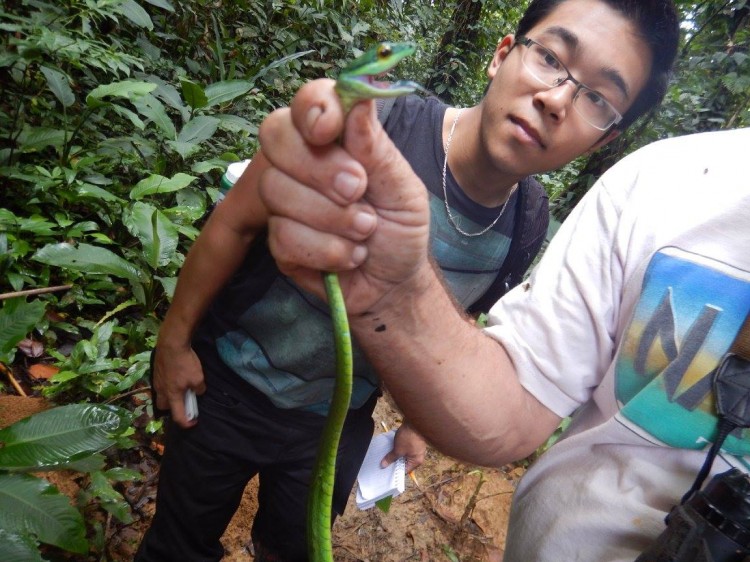Rainforest research helps Randolph senior prepare for conservation career
Dan Phung ’15 spent three weeks of his winter break on an isolated island in Panama, where he explored the rain forest in the morning, snorkeled to see coral reefs in the afternoon, and stargazed with his feet in tropical waters at night.
“It was a unique experience in the wilderness,” said Phung. “We only had electricity three hours a day, used solely rainwater, and spent most of our time in nature.”
 Phung went to Panama to take courses in tropical rain forest and canopy ecology from the Institute for Tropical Ecology and Conservation (ITEC), a non-profit, education, research and conservation organization operating the Bocas del Toro Biological Station in Panama. He paid for the program with a grant from the Randolph Innovative Student Experience (RISE) program.
Phung went to Panama to take courses in tropical rain forest and canopy ecology from the Institute for Tropical Ecology and Conservation (ITEC), a non-profit, education, research and conservation organization operating the Bocas del Toro Biological Station in Panama. He paid for the program with a grant from the Randolph Innovative Student Experience (RISE) program.
As part of the course, Phung and six other students venture deep into the rain forest to study the biodiversity there with two ITEC professors, who gave them informal lectures about their surroundings along the way. They took note of various animals they saw, including snakes, three-toed sloths, and spiders. “The biggest one was about the size of my palm,” said Phung.
Although he was there to learn about biodiversity and ecology, Phung also learned a lot about climbing trees—to reach one research platform, he had to climb about 150 feet using a single rope. “The animals living up there are also very special. I saw a Capuchin monkey for two or three seconds as it was moving between branches,” Phung said.
Phung also carried out his own senior research project, which involves segmenting carbon dioxide (CO2) emissions from primary and secondary rain forests and comparing the two samples. “It was the perfect place for my research because the two types of forest are right next to each other,” he said. “I found out that primary forest has fewer trees but captures more CO2 because the trees have much more mass.”
However, the secondary forest—a rain forest that has been disturbed and is now recovering—is growing faster, meaning its rate of capturing greenhouse gases might be higher in the future, Phung said. “Therefore, conserving both types of rain forest is a powerful solution to climate change.”
The hands-on experience in Panama gave Phung a clearer sense of his career direction. “Now, I feel more confident and competent to enter the job market,” said Phung. “I feel more equipped with all the knowledge and practical skills from this first-hand experience with tropical ecology and conservation.”
More importantly, the trip reminded Phung of why he chose to pursue a career in environmental conservation in the first place. “Almost every night, we would walk out to the dock and look up at the sky, where there were more stars than I have ever seen in my life,” Phung said. “Dipping my feet in the ocean and having my eyes to the sky, I would never forget such an awesome view.”
Tags: Center for Student Research, environmental studies, experiential learning, randolph innovative student experience, research, rise, student research
